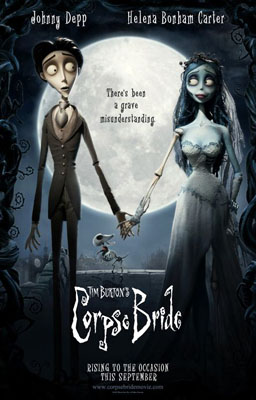 It seems like just a few months ago that we had a Tim Burton movie in theaters. Get it? It WAS just a few months ago! And that film, Charlie and the Chocolate Factory, featured some of the same people who ended up in Tim Burton’s new stop-motion film, The Corpse Bride. Johnny Depp plays Victor, a young man who accidentally ends up married to a cadaver. Helena Bonham Carter, Tim Burton’s girlfriend and the mother to his child, plays the stiff.
It seems like just a few months ago that we had a Tim Burton movie in theaters. Get it? It WAS just a few months ago! And that film, Charlie and the Chocolate Factory, featured some of the same people who ended up in Tim Burton’s new stop-motion film, The Corpse Bride. Johnny Depp plays Victor, a young man who accidentally ends up married to a cadaver. Helena Bonham Carter, Tim Burton’s girlfriend and the mother to his child, plays the stiff.
The Corpse Bride played at the Toronto Film Festival, continuing a tradition of major Hollywood releases hitting that town a few weeks before opening elsewhere. In this case only a week – The Corpse Bride opens in limited release on September 16 and goes wide on the next Friday (look for my review then). At Toronto we had a chance to speak with the cast and Danny Elfman and co-director Mike Johnson, interviews I will be bringing you next week.
Tim Burton was actually the last person to come to our room, where there was a mini press conference. Burton’s getting a little doughy in his old age, but he still has that wild shock of Edward Scissorhands hair, and is still wearing a pair of shades indoors. People with only a superficial knowledge of his films would be surprised that he’s not a dark and gloomy guy to speak to, but anyone who watches his movies knows that the dark and gloomy elements almost always are just a covering on real joy and a childlike sense of wonder.
Q: You’ve been dealing with the dead and the undead since Frankenweenie. What is the appeal of that theme?
Burton: I think dealing with the undead comes from growing up in Burbank. Sort of suburban kind of feeling… it’s kind of like Night of the Living Dead during the day, in the bright sunlight.
But yeah, I don’t know. I’ve always liked monster movies and I’ve always been fascinated by – again, growing up in a culture where death was looked upon as a dark subject and living so close to Mexico where you see the Day of the Dead with the skeletons and it’s all humor and music and dancing and a celebration of life in a way. That always felt more of a positive approach to things. I think I always responded to that more than this dark, unspoken cloud in the environment I grew up in.
Q: Are you optimistic that the afterlife is as colorful as you painted it in this movie?
Burton: I have no idea what happens, but I do respond to other cultures that treat life with a much more positive approach. It teaches – especially when you’re a child – it teaches you to be afraid of everything, you feel like something bad is always going to happen. As to where that other way seems a much more spiritual and positive approach. That’s as far as I go, since I have no idea what will happen.
Q: You work in a lot of mediums, including art. What was it that eventually drew you to movies?
Burton: I always liked to draw, as every kid does, and to make Super 8 movies, as a lot of kids did. Weirdly, I never had the real goal to do that until in school I was such a bad student and I had to read a book and write a 50 page essay on it, and I said, ‘I can’t read and I can’t-‘, so I made a little Super 8 film on Houdini. I remember not reading the book, not having to write and getting an A+ on the project and thinking, ‘This might be a good way to make a living!’
I always liked making things, and then I fell into animation. And then luck comes into it as well.
Q: About the McFarlane toy line for The Corpse Bride – how hands on were you in designing that?
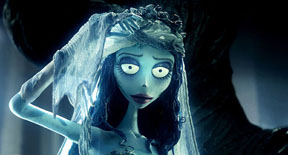 Burton: That’s very important to me, especially on a project like this. It’s harder on live action stuff to get things right, but on this it was pretty simple – make it look like the damn puppets! They’re so beautiful and they’re so right there, it’s like, that’s it. So I hope, and I think, that they’re great, and there’s no reason for them not to be. I always said that I’m not into mass-marketing things. If there’s one thing that looks cool, that’s fine by me. I’m not interested in a whole bunch of stuff.
Burton: That’s very important to me, especially on a project like this. It’s harder on live action stuff to get things right, but on this it was pretty simple – make it look like the damn puppets! They’re so beautiful and they’re so right there, it’s like, that’s it. So I hope, and I think, that they’re great, and there’s no reason for them not to be. I always said that I’m not into mass-marketing things. If there’s one thing that looks cool, that’s fine by me. I’m not interested in a whole bunch of stuff.
Q: I was disappointed that there’s no dog in the announced line.
Burton: There will be.
Q: What were the animated cartoons and movies that you saw as a kid? Is that why you went into this?
Burton: It mainly had to do with Ray Harryhausen. His work was the one – he was the guy. If I saw his name – no actor meant anything, but his name meant something. That’s where the love for this type of animation came from for me, because you could see an artist at work. His monsters had more personality than most of the actors in the movies they were involved in. Even if the monster was just a monster, the death scene was always so beautiful and so tragic. The final little twist of the tail, or whatever, the one final breath. He brought such passion to the work. He was the guy who not only inspired me, he inspires almost any animator. not only inspired me, he inspires almost any animator.
In fact, several months ago Johnny and Helena and I went to his house in London and met him for the first time. He was such an amazing man, and so generous with his time and enthusiasm. And then he went to the set of The Corpse Bride and production just ground to a halt that day because everybody was just like [worships with his arms]. He truly has inspired not just stop motion animators, but any animator.
Q: Do you think everything in The Corpse Bride is appropriate for children? Some of it might be scary or grisly.
Burton: I’ve always had problems with that with certain adults. I remember people saying that about Nightmare, and tiny, tiny little kids come up and the love the movie. I think it’s more of an adult problem than it is a kid problem. Even Corpse Bride I find is much softer in a certain way. It’s basically a love story and an emotional story, with humor. Like any kind of fable or fairy tale there are elements that are slightly unsettling, but that’s part of the history of those kinds of stories.
Q: So how do you feel about the rating the film got?
Burton: It got PG, which I think is appropriate. As I said, to me the story is quite just emotional and not – I personally don’t find it dark at all. In the same way as Nightmare, and I think it’s less dark than that in a certain way.
I also think adults forget that kids are their own best censors. Some kids like that kind of stuff and some kids don’t, and they’re usually the best ones to judge it. I think it’s when adults go, ‘Oh no you can’t see this, you can’t see that,’ it creates this climate of fear and it makes children more afraid. I have a child that’s under two years old and he’s watched When Dinosaurs Ruled the Earth, and he’s watched Viva Las Vegas, which isn’t a horror movie but some people might call it scary! I think it’s about how you present things. If he got scared he would run away. But if I went [covers imaginary child’s eyes] ‘Oh my God! Elvis and Anne Margaret are about to dance!’ he’d freak out.
Q: Do you think there are things that are inappropriate for him to watch?
Burton: Well, I’m not going to start showing porno movies or anything. I find it’s a fascinating subject, and I was talking to somebody who’s writing a book on it. You go to a shop and here’s the Teletubbies, here’s the Wiggles – it’s like this very limited… which some might say is scarier than most horror movies. It’s interesting, if you show them other things and don’t present it like ‘Ohhhhh!’, it’s amazing what they might accept.
Q: The movie itself looks so beautiful –
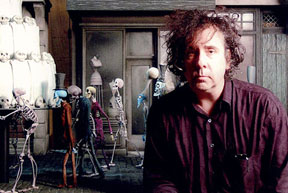 Burton: Thank you. A lot of great artists worked on it, and that’s what I like about it, it’s an artform. It makes you feel like you’re working in an artform and not a business.
Burton: Thank you. A lot of great artists worked on it, and that’s what I like about it, it’s an artform. It makes you feel like you’re working in an artform and not a business.
Q: How was it directing this, since Henry Selick directed Nightmare?
Burton: The difference on that was that one I had designed completely. It was a very completed package, in my mind. I felt that it was there. I felt a bit more comfortable with that.
With this, it was a bit more organic. It was based on an old folk tale and we kept changing it. I had a great co-director with Mike Johnson. I feel like we complemented each other quite well. It was just a different movie, a different process.
Q: The characters in your movies are usually very odd and strange, outsiders. Now that you have a happy relationship and a kid, is there still a source of understanding where outsiders come from? Does it freak you out to be in a happy situation?
Burton: Things aren’t as happy – no, no! [laughs] I think the thing is that you’re very affected by your early life, and I think that if you ever had that feeling of outsider, or loneliness or whatever, it just doesn’t leave you. You can be happy and successful, whatever, but I think that thing stays inside of you. It doesn’t ever really leave you. You kind of always will have that.
Q: Helena told us that she had to audition for the role, and that she had to wait two weeks to hear if she got the role. Why did she have to audition, and what was it like for those two weeks?
Burton: She’s an actress so she’s making it more dramatic. There was probably a slight little bit of torture there, but it’s a two way street! It wasn’t as dramatic as that. I think maybe because I’m with her I was a little harder on her than I would be with somebody [else]. Nobody else had to audition, that’s true.
But she’s cool about it. Long before I met her she’s done many movies, she’s very secure with herself and what she’s done. There’s never any problems… yet. Yet. Seriously, she’s been fine.
Q: Would you dare not to cast Helena in one of your films?
Burton: Of course. I wouldn’t just cast her to cast her, in the same way I wouldn’t cast Johnny or somebody I love working with just to have them in the movie. You always want it to be the right thing and the right role. And I think she understands that, and I think most of the people I work with understand that.
Q: Are there other pop culture things that are influencing you on new projects?
Burton: I don’t have any new projects coming up. The Rankin and Bass, Rudolph the Red Nose Reindeer, that kind of stuff. Things you grew up watching, they just stay with you. They form what you like to do?
Q: How about comic books?
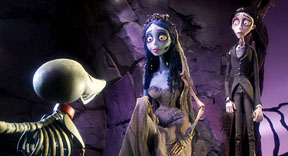 Burton: I wasn’t a big comic book reader. I always had trouble knowing which box to read next. I was always reading from the wrong box. I was like, this is a comic book that doesn’t make any sense! I think I was reading them all out of sequence. Do I read the one up here or the one down here? I couldn’t quite deal with it.
Burton: I wasn’t a big comic book reader. I always had trouble knowing which box to read next. I was always reading from the wrong box. I was like, this is a comic book that doesn’t make any sense! I think I was reading them all out of sequence. Do I read the one up here or the one down here? I couldn’t quite deal with it.
Q: Was the working relationship with Johnny much different on Corpse Bride?
Burton: It was weird because it was the same – he was Willy Wonka by day and Victor by night. It might have been a little schizophrenic for him. But he’s great. This is the first animated movie he’s done, and he always into a challenge. We just treat it like fun and a creative process, and again, that’s the joy of working with him. He’s kind of up for anything.
Q: Was there something he added to the character?
Burton: He always adds something. The amazing thing is that all of the actors never were in a room together. Except for Albert and Joanna did a few scenes together, they were all separate. They were working in a vacuum, which was interesting. That’s the thing that I thought ended up so beautifully, that their performances meshed together. He was very canny – as they all were – about trying to find the right tone and making it all work without being in the same room with each other.
Q: I recently spoke to Mark Wahlberg, and he said that if he could do it all over again he wouldn’t do Planet of the Apes, and that he thought you would feel the same way. Do you agree with that?
Burton: It’s probably one of those films where – I like the challenge of doing things you know that you maybe shouldn’t do. There’s something about taking a classic movie that people love and doing another version of that, you’re setting yourself up for a mistake. I loved working with him, so I’d do that again. But you know, I try not to go back in retrospect and say oh, I shouldn’t have done this or shouldn’t have done that. You make your decisions and you live by them. It made money, it got a critical drubbing, but every project that you do – I never sort of really regret anything because you make your choices and I like to stand by them.
Q: Speaking of remakes and adaptations, is there another piece of classic literature you’d like to put your stamp on?
Burton: Not at the moment. Again, that’s always a risky thing, especially if you’re thinking of classic movies. I think I would try to avoid that. There are certain ones that can’t be topped. I find that for me it’s been more successful to do more personal things.
Q: But you have turned some literary classics into films, most recently Charlie.
Burton: Some people kept saying, Oh you’re remaking the movie. But that one, with Charlie, none of us felt we were remaking the movie, we were trying to make the book. Even John August, the writer, never even looked at the movie. That was one we didn’t really feel pressured to try to top the other movie.
Q: Johnny told us he scrambled his Corpse Bride character together in fifteen minutes. Was it really that haphazard, or is he being dramatic?
Burton: Oh yeah. We were shooting Charlie one day and I said, ‘Let’s go over to the recording booth and start doing some recording.’ As he was walking over I think he was saying to himself, ‘Shit, what’s this character? I have no idea!’ The great thing about him is that he likes to work spontaneously, so really in that one session he got it. He might have been a bit worried to begin with, but I think he likes that.
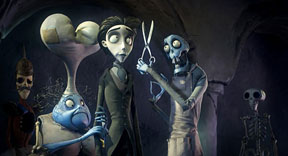 Q: Now that you’ve had two movies released a few months apart, can you talk at all about what you want to do next?
Q: Now that you’ve had two movies released a few months apart, can you talk at all about what you want to do next?
Burton: With two at once – also in that time I was taking dance lessons and learned to play the clarinet, so I think I’ve got to take a rest for a while! I’m going to sort of take time off for a while.
Q: Do you plan to do more stop motion animation ever?
Burton: I do, but I want to do it with the right story. Nightmare seemed right for the process, Corpse Bride seemed right for the process. I wouldn’t do just anything in the process, you need to mix the right story with the medium. But sure, I would love to do it again.
Q: You’re saying that your characters are outcasts, but the cast that you use – do you see them as outcasts as well?
Burton: You mean Johnny and Helena? Well of course. I mean, Johnny definitely. I think that’s one of the reasons I responded to him when I met him on Edward Scissorhands. He’s sort of looked upon as this sort of handsome leading man, but I don’t think in his heart he felt that way, and that was why he wanted to do Edward Scissorhands. He understood that being perceived as one thing and being something else.
Q: And Helena?
Burton: Same thing. She’s perceived as this – especially if you read the London papers – one of the worst dressed people in the history of Britain, or some sort of posh aristocrat. She’s completely misperceived. It maybe bothers her a little bit, but once you get labeled, there’s nothing you can do about it, but I’m sure there’s something about it she feels.
Q: What do you think of Superman finally getting made?
Burton: Oh, I don’t know. Finally.